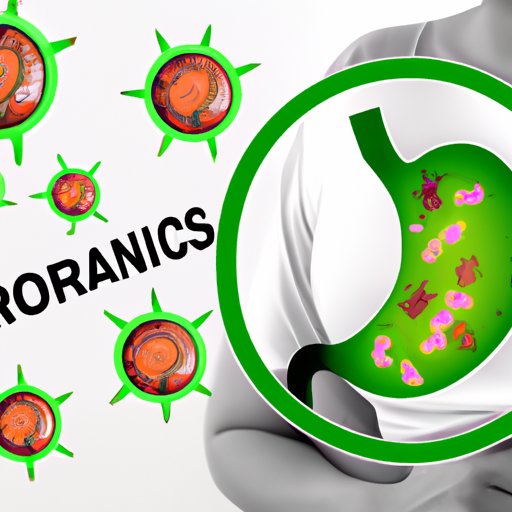
Introduction
Stomach viruses are a common illness that can cause vomiting, diarrhea, and stomach cramps. They are highly contagious and can be easily spread from person to person. Knowing how to prevent and avoid stomach viruses is important to avoid getting sick and stopping the spread of infection.
The Top 5 Ways You Can Contract a Stomach Virus: Everything You Need to Know
Stomach viruses are usually caused by norovirus and can be easily transmitted through contact with infected people, surfaces, or objects. The top five ways people can contract a stomach virus are:
- Eating food that has been contaminated with norovirus
- Direct contact with someone infected with norovirus
- Touching infected surfaces or objects and then touching your mouth or face
- Drinking contaminated water
- Changing a diaper or caring for someone who is sick and infected with norovirus
It is essential to understand the science behind how stomach viruses are contracted and transmitted to take necessary steps to avoid infection.
Staying Safe: Easy Steps to Avoid Catching a Stomach Virus
The best way to avoid catching a stomach virus is to practice good personal hygiene. Some simple things you can do to stay safe include:
- Wash your hands frequently with soap and warm water before eating, after using the bathroom, and after handling objects/surfaces that may be contaminated
- Clean and disinfect surfaces regularly, especially those that are touched frequently like doorknobs, computers, phones, and faucets
- Avoid sharing food and drinks with others
- Avoid close contact with those who are already infected by the virus
- Avoid foods that are raw or undercooked and drinking untreated water when traveling to another country
From Contaminated Food to Unwashed Hands: Ways to Get a Stomach Virus and How to Prevent Them
The most common method of getting a stomach virus is consuming contaminated food or water. Some foods that are likely to be contaminated include oysters, raw fruits and vegetables, and shellfish. Both food and water can be contaminated with norovirus from the environment where hygiene is subpar or even factory settings. It is strongly advised to wash fruits and raw vegetables before consuming
Another major way people get stomach viruses is from infected people. Infected people shed norovirus for at least two days after they recover, and the virus can stay on surfaces for up to two weeks. This makes it essential to practice good hygiene and avoid close contact with those who are infected.
Unwashed hands can also cause stomach viruses. Norovirus is resistant to many disinfectants, making it essential to thoroughly wash your hands with soap and water for at least 20 seconds regularly. Hand sanitizers are also efficient if 60 percent of the solution consists of alcohol content.
Protecting Yourself and Others from Stomach Viruses – A Comprehensive Guide
Aside from personal hygiene, there are still other ways to protect yourself and others from stomach viruses:
- Always clean and sanitize common areas like the bathroom, doorknobs, and other areas that are frequently touched by a lot of people.
- If you are sick, stay in bed until you have fully recovered. Do not share your personal belongings or utensils with anyone else
- Parents should always take precautions when changing diapers and ensure that infants wash their hands often and use hand sanitizers
- Those working in health care facilities should take necessary precautions to maintain proper hygiene, including using disposable gloves and gowns when in contact with infected patients, washing hands regularly and seeking necessary treatment if they become infected.
The Science behind How You Get a Stomach Virus and What You Can Do to Stay Healthy
Stomach viruses usually cause the body to produce vomiting and diarrhea. This offers a mechanism to rid the body of the virus, as well as help protect the stomach lining from the harsh effects of the virus.
If you are infected with the virus, recognize the early signs and take necessary treatment measures. It is, however, important to note that nausea, fever, coronary symptoms, or bloody stools should not be considered normal and medical attention should be sought immediately.
Germs, Infection, and Stomach Viruses: What Everyone Needs to Know
Germs are everyday microbes that can cause infections, and stomach viruses are among the most common infections. By practicing good personal hygiene, it is possible to avoid or reduce the risk of infection. Avoiding contaminated food, water, and close contact with infected individuals reduces the risk of contracting norovirus
Navigating Stomach Viruses: Essential Tips on how to Avoid Them and What to Do If You Get Sick
If you are infected with a stomach virus, it is essential to remain hydrated to reduce the symptoms of vomiting and diarrhea. Oral rehydration solutions help to avoid dehydration and yogurt and other probiotics help to replace loss nutrients in the body during the illness. In severe cases, medical attention should be sought. Those in good health usually recover within a few days. It is important to stay home during the entire illness period to avoid the spread of infection
Conclusion
Stomach viruses can be highly contagious, but prevention is easy. By following the proper steps, you can avoid getting sick and protect yourself and others. Practicing good personal hygiene and staying hydrated are essential keys to staying healthy and avoiding stomach viruses. By taking these simple steps, you can make sure that you and your family stay healthy and safe.





